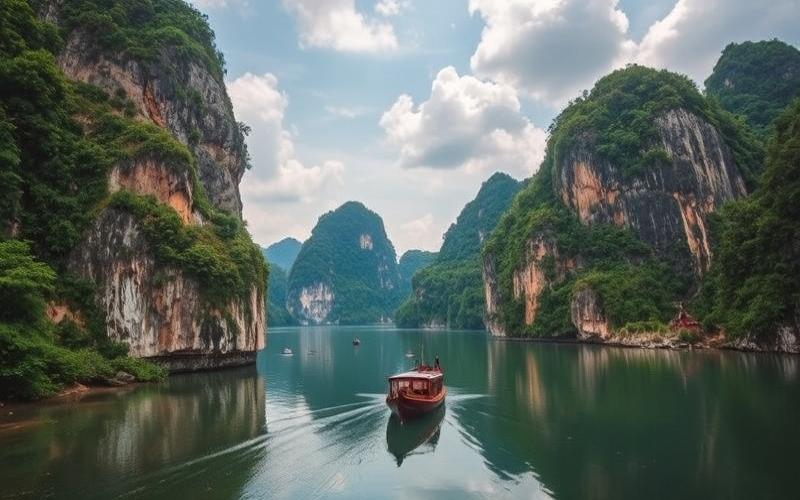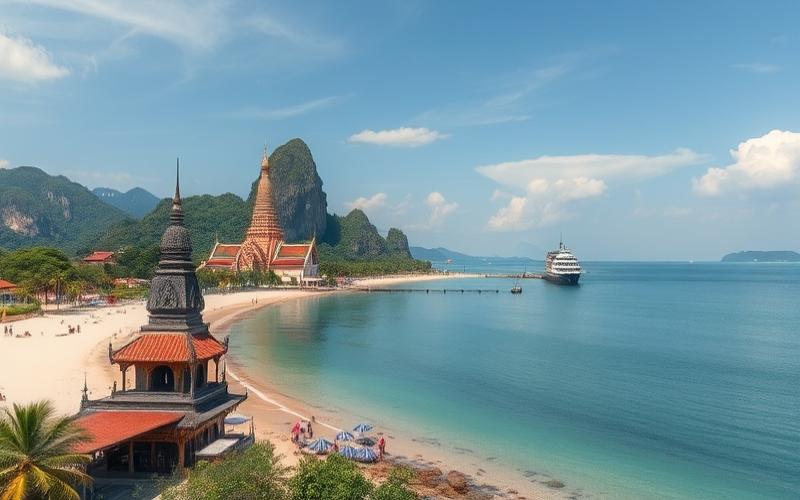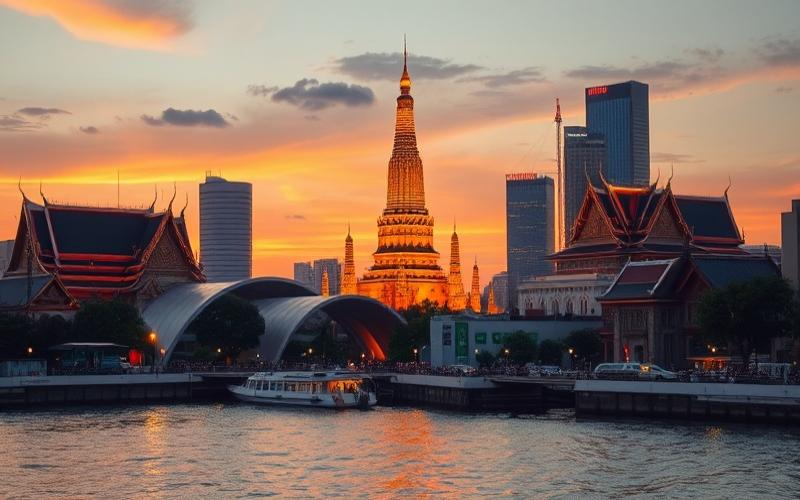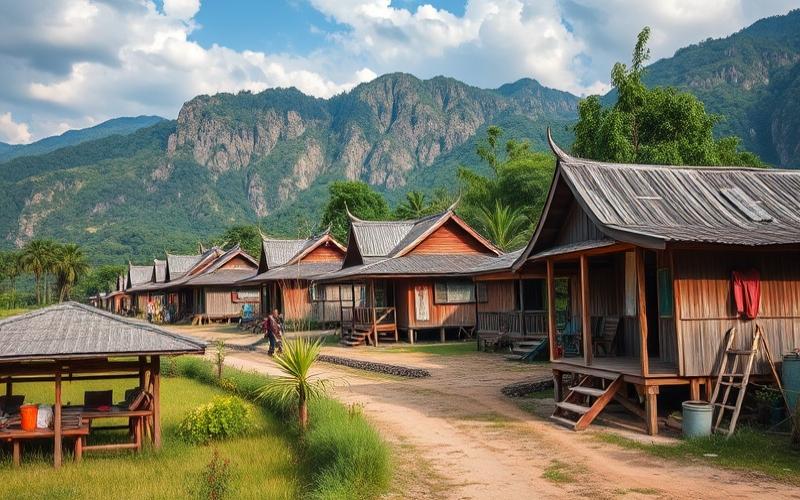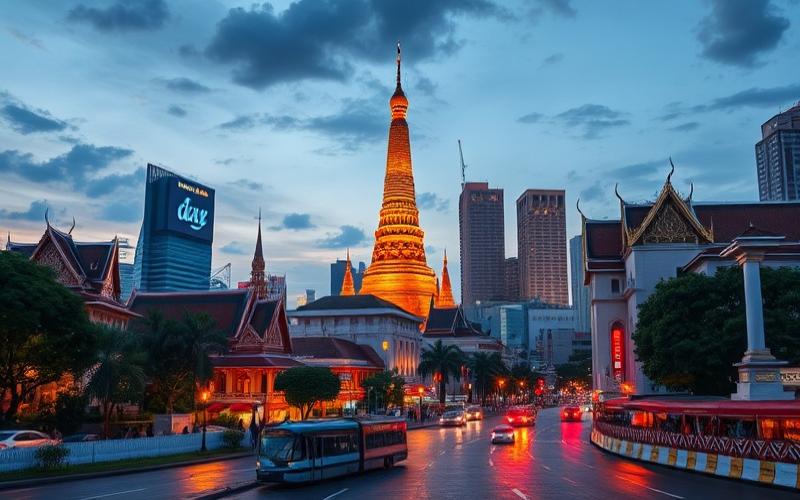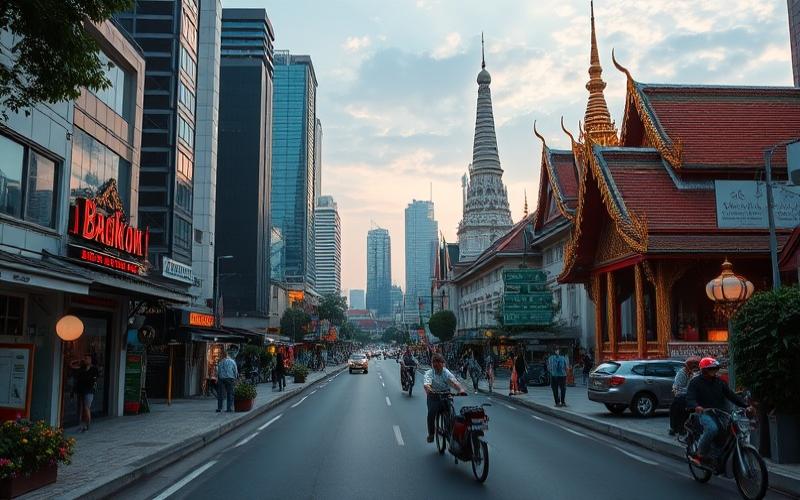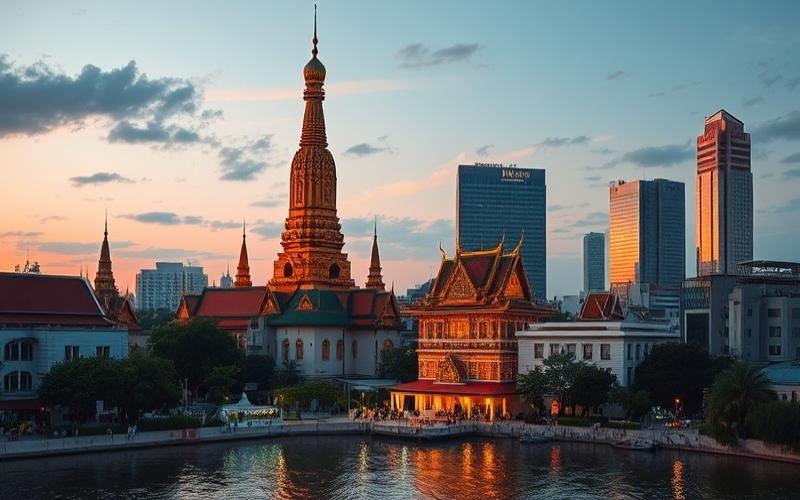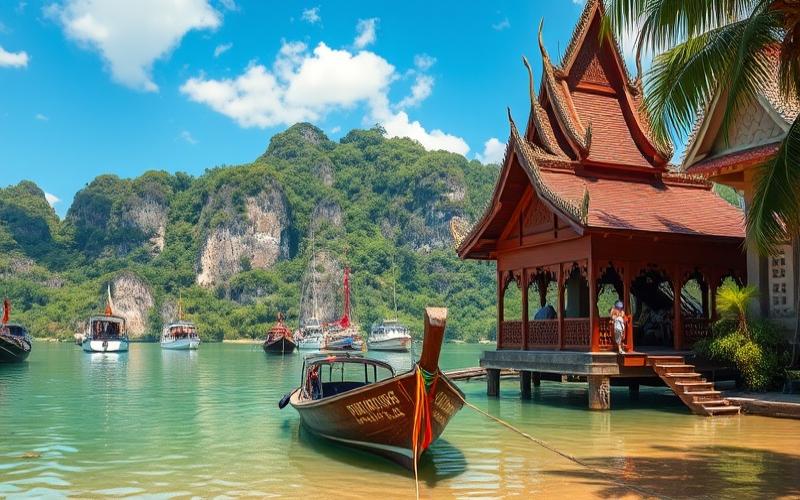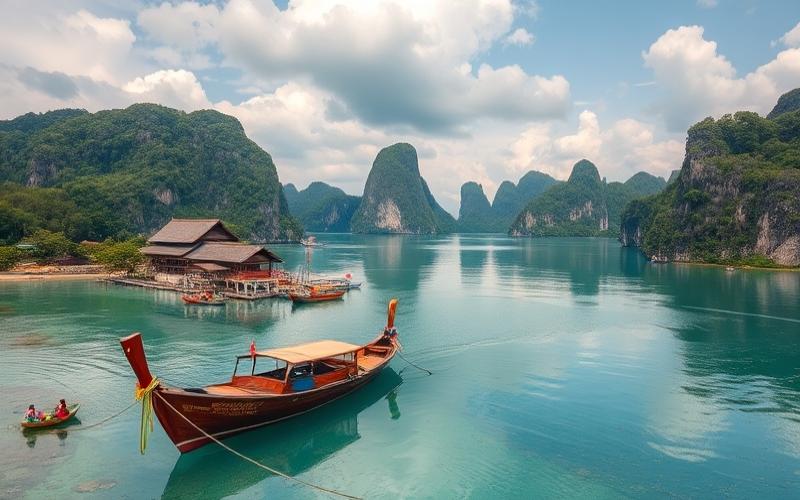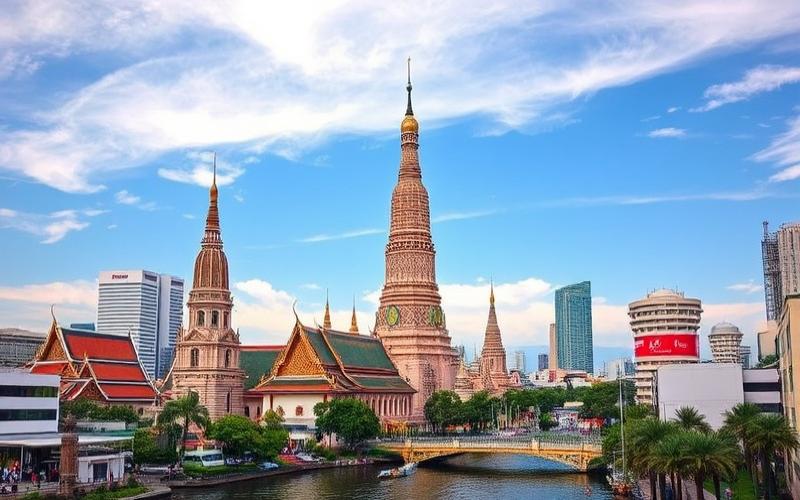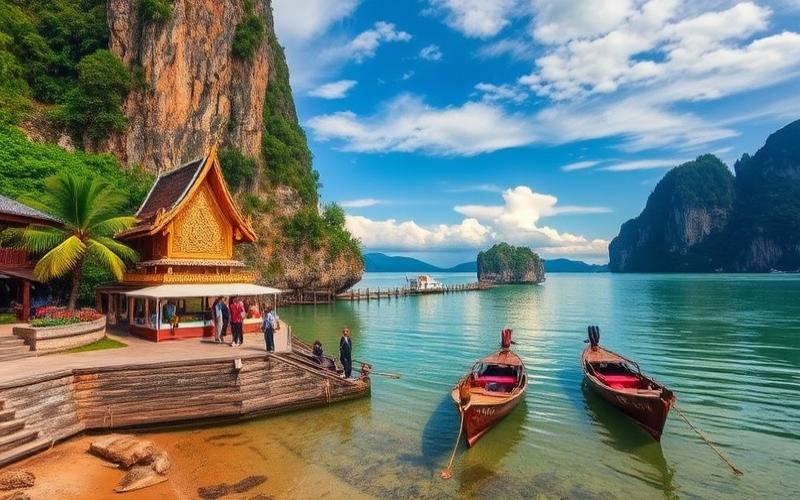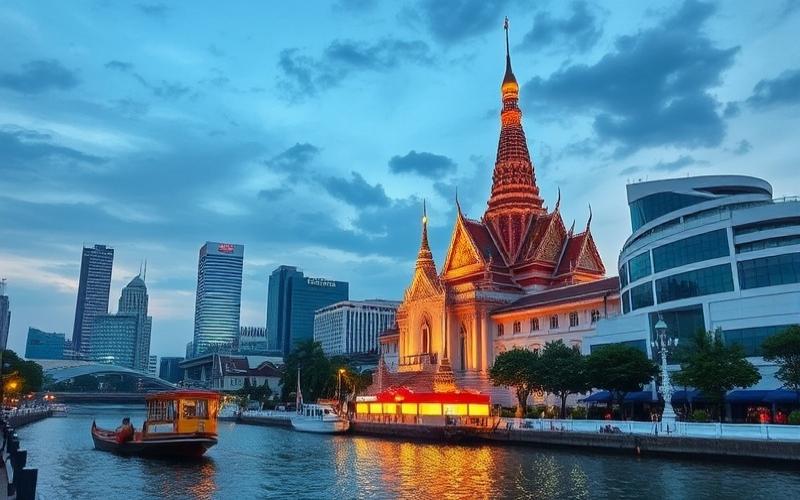
 Published on and written by Cyril Jarnias
Published on and written by Cyril Jarnias
The Thai real estate market is currently experiencing renewed interest from international investors. Despite global economic challenges, the Land of Smiles continues to attract foreign buyers thanks to its undeniable assets: exceptional living conditions, modern infrastructure, and prices that remain affordable compared to other Asian destinations. Let’s dive into the latest trends shaping this dynamic and promising market.
Dream Real Estate Hotspots
Thailand offers a diversity of attractive destinations for real estate investment, each with its own unique characteristics and charm. Here are the areas generating the most excitement:
Bangkok, the Buzzing Metropolis
The Thai capital remains the beating heart of the country’s real estate market. Its status as an economic and cultural hub, combined with its continuously improving transportation infrastructure, makes it a prime destination for investors. Central neighborhoods like Sukhumvit, Silom, and Sathorn continue to attract attention, but growing interest is also being observed in more peripheral areas like Thonglor or On Nut, which offer better value for money.
Phuket, the Island of Many Faces
Long considered merely a vacation destination, Phuket is now establishing itself as a mature and diversified real estate market. The island attracts both retirees seeking a better quality of life and investors looking for high rental yields. The most sought-after areas include Kata, Karon, and Kamala for their paradise beaches, as well as Chalong and Kathu for their more local atmosphere and more affordable prices.
Chiang Mai, the Northern Gem
The “Rose of the North” is attracting more and more expatriates and investors looking for a more peaceful alternative to Bangkok. Its pleasant climate, cultural richness, and attractive cost of living make it a prime destination for retirees and digital nomads. The Nimman and Old City neighborhoods are particularly sought after for their bohemian atmosphere and varied real estate offerings.
Pattaya, the Rebirth of a Seaside Resort
Long associated with mass tourism, Pattaya has undergone a spectacular transformation in recent years. The city now attracts a more upscale clientele thanks to its new infrastructure and luxury real estate projects. The areas of Jomtien and Na Jomtien, further south, are experiencing rapid development and offer interesting opportunities for investors.
Good to Know:
Although these destinations are the most popular, there are also interesting opportunities in secondary cities like Hua Hin, Koh Samui, or Krabi, which often offer better long-term appreciation potential.
Price Evolution: Between Stability and Controlled Growth
The Thai real estate market has shown remarkable resilience in the face of global economic turbulence. After a period of stagnation linked to the COVID-19 pandemic, prices have resumed an upward trajectory, albeit moderate.
Stable Growth in Major Cities
In Bangkok, prices for luxury condominiums in central neighborhoods have seen an average annual increase of 3 to 5% in recent years. This trend is expected to continue, driven by sustained demand from local and foreign investors. In more peripheral areas, growth is more modest, around 1 to 3% per year, thus offering opportunities for first-time buyers and investors seeking attractive rental yields.
Marked Regional Disparities
In Phuket, after a post-COVID correction period, prices seem to be stabilizing and are even rising again in certain market segments. High-end villas with sea views are experiencing annual appreciation of around 4 to 6%, while more affordable condominiums see their prices increase by 2 to 4% per year.
Chiang Mai, meanwhile, shows more moderate but steady growth, with price increases of around 2 to 3% per year for residential properties. This measured progression reflects the city’s growing appeal among expatriates and foreign retirees, while maintaining accessible price levels.
The Impact of New Regulations
It’s important to note that the Thai government has recently implemented new regulations aimed at overseeing the real estate market and preventing the formation of speculative bubbles. These measures, which include restrictions on mortgages and increased control over foreign investments, have helped moderate price growth in certain market segments.
Good to Know:
Although prices are generally rising, there are still opportunities to purchase at attractive rates, particularly in off-plan projects or developing areas. Thorough research and the assistance of a local real estate agent can help you find the best deals.
Property Types to Prioritize: Between Yield and Quality of Life
The choice of property type to acquire in Thailand largely depends on your investment goals and lifestyle. Here’s an overview of the most interesting options according to investor profiles:
Condominiums: The Practical Choice
Apartment buildings, commonly called “condos” in Thailand, remain the preferred option for many foreign investors. Their main advantage lies in the simplicity of the purchasing process, as foreigners can own 100% of a condo unit (within the limit of 49% of the units in a building).
Condos generally offer attractive rental yields, particularly in tourist areas like Phuket or Pattaya. In Bangkok, studios and one-bedroom apartments in well-located complexes with modern amenities (pool, gym, etc.) are particularly sought after by expatriate tenants and long-term tourists.
Villas: For High-End Investment
For those seeking a more substantial investment and superior quality of life, villas represent an excellent option. Although land purchase is restricted for foreigners, it’s possible to acquire a villa through a long-term lease (typically 30 years, renewable) or by creating a Thai company.
Villas often offer better long-term appreciation potential, especially in sought-after destinations like Phuket or Koh Samui. They are also highly valued in the high-end seasonal rental market, potentially generating substantial income during the peak tourist season.
Townhouses: An Interesting Compromise
Townhouses are gaining popularity, particularly in Bangkok and secondary cities. They offer a good compromise between the space of a single-family home and the practicality of an apartment. Although direct purchase by foreigners is limited, these properties can be acquired through appropriate legal structures.
Townhouses are particularly attractive for expatriate families seeking space and tranquility while remaining close to urban centers. They also offer good potential for long-term rental yield.
Commercial Properties: To Diversify Your Portfolio
For more experienced investors, commercial properties (offices, coworking spaces, retail) can offer interesting yields, particularly in developing areas of Bangkok or in shopping centers in beach resorts. However, this type of investment requires in-depth knowledge of the local market and specific regulations.
Good to Know:
Regardless of the property type chosen, it’s crucial to thoroughly study the location, construction quality, and developer’s reputation before investing. Don’t hesitate to consult a specialized lawyer to ensure the legality of the transaction and protect your interests.
Future Outlook: A Market in Full Transformation
The Thai real estate market is constantly evolving, adapting to new trends and the changing needs of investors and residents. Several factors are likely to influence its development in the coming years:
The Rise of Remote Work
The pandemic has accelerated the remote work trend, attracting many digital nomads to Thailand. This new clientele seeks housing offering comfortable workspaces and reliable internet connections. Real estate developers are beginning to adapt their offerings accordingly, integrating coworking spaces into new residential projects.
Sustainability at the Heart of Concerns
Faced with environmental challenges, more and more real estate projects in Thailand are emphasizing sustainability. Eco-friendly buildings, using environmentally friendly materials and incorporating energy-saving technologies, are gaining popularity among buyers conscious of their ecological impact.
Infrastructure Improvements
The Thai government continues its massive investments in infrastructure, particularly in transportation. The extension of the metro network in Bangkok and the development of new high-speed rail lines connecting the country’s main cities are expected to have a significant impact on the real estate market, opening up new areas for investment.
Diversification of Foreign Investors
While Chinese investors have long dominated the foreign real estate market in Thailand, there is a growing diversification of nationalities. European, American, and Middle Eastern buyers are increasingly present, bringing new dynamics to the market.
Good to Know:
The Thai government is considering easing some restrictions on foreign ownership to stimulate investment. Although these changes are not yet finalized, they could open up new opportunities for international investors in the coming years.
In conclusion, the Thai real estate market offers a range of opportunities for savvy investors. Whether you’re looking for a vacation home, a permanent residence, or a rental investment, Thailand has much to offer. However, as with any foreign investment, it’s crucial to thoroughly research legal and tax aspects and to surround yourself with competent professionals to successfully carry out your real estate project in the Land of Smiles.
Disclaimer: The information provided on this website is for informational purposes only and does not constitute financial, legal, or professional advice. We encourage you to consult qualified experts before making any investment, real estate, or expatriation decisions. Although we strive to maintain up-to-date and accurate information, we do not guarantee the completeness, accuracy, or timeliness of the proposed content. As investment and expatriation involve risks, we disclaim any liability for potential losses or damages arising from the use of this site. Your use of this site confirms your acceptance of these terms and your understanding of the associated risks.





